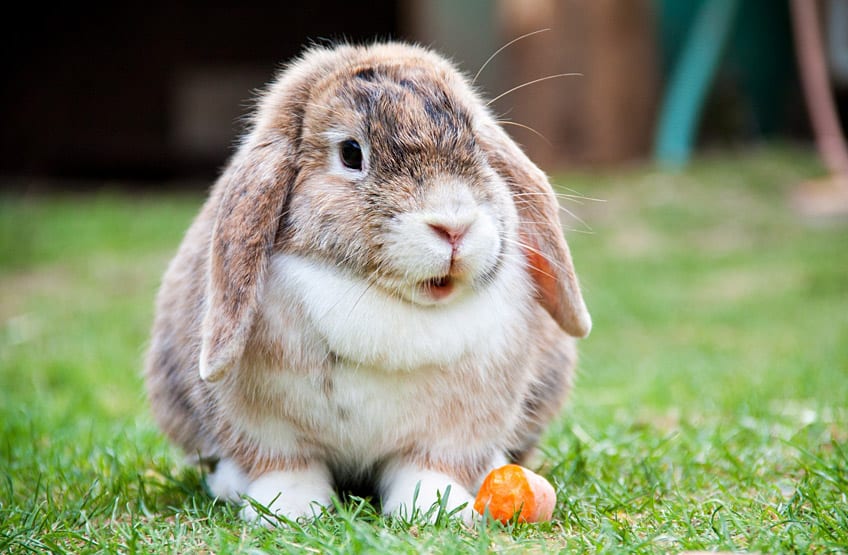Wild rabbits don’t need to worry about their teeth. This is because the vast majority of their diet is composed of high quality grass and hay, with occasional leaves and twigs thrown in for good measure.
Not only does this diet promote good gastro-intestinal health, it also encourages almost constant chewing. And this regular chewing keeps their constantly-growing teeth in good shape.
So when it comes to dental care for rabbits, a lot of problems can be avoided outright through simply giving them a diet that closely resembles what they’d eat in the wild. But if you’re unable to give your rabbit a natural diet, or if you’d like to know more about dental care for rabbits, this short guide should give you enough information to ensure your rabbit is healthy.
Some Interesting Facts about Rabbit Teeth
Those who own cats and dogs might have to get used to regularly brushing their pets’ teeth. However, a vet will never advise you to start brushing your rabbit’s teeth. This is because, as rodents, rabbits have completely different kind of tooth. When it comes to teeth, cats and dogs are just like you.
They’re born with baby teeth that fall out as they get older. These are replaced by sturdy adult teeth which, with sufficient dental care, should last a lifetime. But a rabbit’s teeth are known as “open rooted” teeth, which means that they’ll continue to grow throughout their entire life. They’re constantly worn down and renewed – which explains why there’s no need for brushing.
What’s Inside Your Rabbit’s Mouth?
Rabbit teeth are designed for chomping and chewing. Rabbits are herbivores, which means that they’ll never have to tear meat or gnaw bones. So instead of the sharp canines that are found in the mouths of cats and dogs, they have a combination of incisors, molars, and premolars.
Their teeth are curved, and enamel is only found on the front surface of the teeth. The back surface of their teeth is coated in softer dentin, which means that the front surface wears down much slower than the back. Your rabbit’s two front teeth – known as the anterior incisors – can grow up to 12cm a year. The vast majority of dental problems concern these teeth, as they’re the most prone to overgrowing and other problems.
Here’s Why Your Rabbit Never Stops Chewing
As we mentioned above, the reason why wild rabbits almost never suffer from dental problems is because they eat a diet rich in roughage, and they constantly chew. Rabbits are thorough chewers, and their technique involves highly organised tongue movements combined with up to 120 jaw movements per minute.
Because of the nature of their jaw muscles, rabbits chew both vertically and horizontally. This is enough to keep their teeth in good shape – so long as their teeth are in perfect alignment.
Malocclusion
Beyond a poor diet, a leading cause of overgrown teeth in rabbits is malocclusion. This is where poor teeth alignment lessens the effectiveness of chewing. Many things can cause malocclusion, but most cases have more than one underlying cause. It can be a combination of infection, genetic issues, and even mild trauma.
A single misaligned tooth is all it takes to throw off a rabbit’s entire bite and chew. As a result, if left unchecked, even small dental issues can soon escalate. But unfortunately, most rabbit owners only notice that there’s a problem once the rabbit’s front teeth have become overgrown. By this point the problem might already be critical, so it’s important to be on the lookout for other early warning signs, such as weight loss, or a tendency for food to fall from your rabbit’s mouth.
Regular trips to the vet will help, as a good vet will inspect your rabbit’s teeth as part of their general check-up. Most rabbits don’t take kindly to this, so some mild sedation might be necessary.
Treating Overgrown Teeth
If your rabbit’s teeth are overgrown, it might be possible to trim them. Because their teeth are structured differently to yours, this is a completely painless process.
Often, sedation isn’t even necessary. If your rabbit has a serious case of malocclusion, it might be necessary to make frequent trips to the vet for periodic trimming. Some rabbits require trimming once a month. But as this procedure can be distressing for rabbits, your vet might instead recommend that the maloccluded teeth are simply removed outright. Extraction is also the recommended course of action for abscesses and other serious dental conditions.
For more information about dental hygiene for rabbits, feel free to get in touch. Call us on 01924 465 592.



Our Services